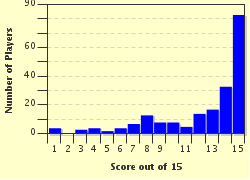Quiz Answer Key and Fun Facts
1. Which sport was Bill McLaren allied to?
2. John Arlott was associated with which sport?
3. Harry Carpenter covered which sport?
4. Eddie Waring made his name covering which activity?
5. Which sport was Dan Maskell closely connected with?
6. Raymond Brooks-Ward lives in the memory for reporting on which of the following?
7. Kenneth Wolstenholme commentated on which sport?
8. Along with football, David Coleman was synonymous with which other sport?
9. Ted Lowe brought a reverence whilst commentating on which activity?
10. Peter O'Sullevan was knighted for his services to which sport?
11. John Snagge found fame commentating on which of the following?
12. Kent Walton brought joy to millions reporting on which sport?
13. Sid Waddell is well known for waxing lyrical about which activity?
14. Murray Walker has traveled the world to commentate on which sport?
15. Which sport was Peter Alliss still an active participant in when he began to commentate on it?
Source: Author
jimpimslim1
This quiz was reviewed by FunTrivia editor
Nightmare before going online.
Any errors found in FunTrivia content are routinely corrected through our feedback system.

